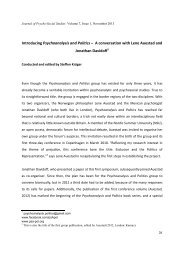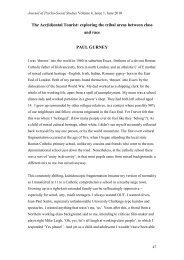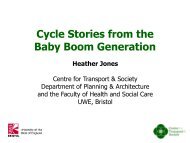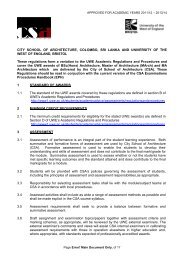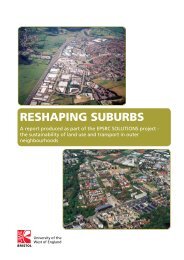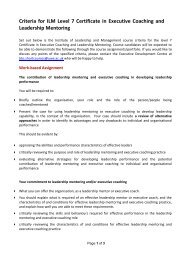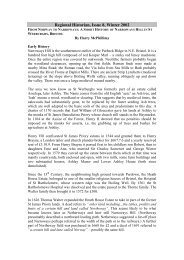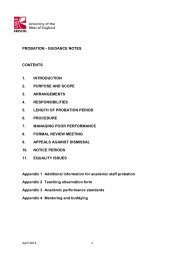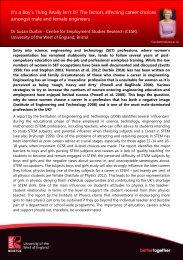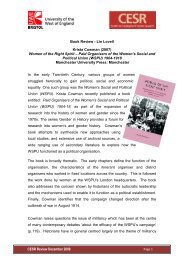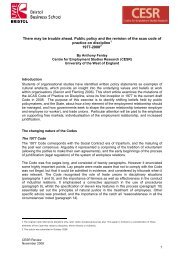UWE opens new Education Innovation Centre - University of the ...
UWE opens new Education Innovation Centre - University of the ...
UWE opens new Education Innovation Centre - University of the ...
Create successful ePaper yourself
Turn your PDF publications into a flip-book with our unique Google optimized e-Paper software.
Chris Hedges, Product Design<br />
Technology and Creative Product<br />
Design<br />
Leggings to reduce injury and improve<br />
running technique<br />
When Product Design Technology student Chris Hedges<br />
discovered that eight out <strong>of</strong> ten marathon runners<br />
get injured every year, he decided to create a product<br />
that would help to reduce injury and enhance running<br />
technique.<br />
'Refine' is a pair <strong>of</strong> specially designed leggings that uses<br />
TPU (Thermoplastic Polyurethane) bands to help <strong>the</strong><br />
body maintain a better shape and posture for running.<br />
Chris explains, "Refine is based on <strong>the</strong> principal <strong>of</strong> using<br />
<strong>the</strong> body's own awareness to train <strong>the</strong> relevant muscles.<br />
By placing <strong>the</strong> bands strategically we are encouraging<br />
<strong>the</strong> body to prepare <strong>the</strong> right muscles needed in <strong>the</strong><br />
movements required in running. Refine follows <strong>the</strong><br />
natural posture <strong>of</strong> <strong>the</strong> body and is a gentle system that<br />
will proprioceptively encourage <strong>the</strong> correct posture for<br />
running and improve technique.”<br />
“It is suitable for all levels - novice, regular and elite,<br />
and <strong>the</strong> product includes an online training package<br />
aimed at <strong>the</strong>se different levels. I hope to take <strong>the</strong><br />
concept forward and plan to test <strong>the</strong> product fur<strong>the</strong>r<br />
with running groups. I really enjoy solving user-centred<br />
design problems and my course has really helped me<br />
get to grips with this type <strong>of</strong> design.”<br />
Chris is already working for 'Innovate Product Design'<br />
based in Salisbury.<br />
19<br />
<strong>UWE</strong> in project to design <strong>new</strong> sensor for<br />
premature babies<br />
Sensor technology developed at <strong>UWE</strong> is being used to<br />
design a brand <strong>new</strong> sensor aimed at detecting a devastating<br />
condition affecting premature babies.<br />
The disease, called necrotising enterocolitis (NEC), typically<br />
strikes without warning. By <strong>the</strong> time it is diagnosed, babies<br />
are <strong>of</strong>ten already extremely ill. Each year in <strong>the</strong> UK, around<br />
3,000 babies develop <strong>the</strong> serious bowel problem. Up to 35<br />
per cent <strong>of</strong> <strong>the</strong>se babies die and survivors <strong>of</strong>ten develop<br />
long-term health problems.<br />
Researchers are now developing a <strong>new</strong> diagnostic test using<br />
smell, which could allow babies with <strong>the</strong> disease to be<br />
identified and treated sooner. They hope this will reduce <strong>the</strong><br />
likelihood <strong>of</strong> <strong>the</strong> disease progressing and <strong>the</strong>refore limit <strong>the</strong><br />
devastating consequences.<br />
The project, funded by children’s charity Action Medical<br />
Research, is led by <strong>the</strong> Birmingham Women’s Hospital.<br />
Researchers at <strong>UWE</strong>, Bristol Royal Infirmary and <strong>University</strong><br />
Hospitals Bristol NHS Foundation Trust are developing <strong>the</strong><br />
sensor which works by detecting gases – or, more specifically,<br />
volatile organic compounds – that are emitted by babies’<br />
faeces early in <strong>the</strong> disease process.<br />
The pioneering chemical sensor technology developed by<br />
Pr<strong>of</strong>essor Norman Ratcliffe, Dr Ben de Lacy Costello and<br />
Dr Natasha Mcguire (all HLS) and Chris Probert from <strong>the</strong><br />
<strong>University</strong> <strong>of</strong> Bristol, is already being used to rapidly diagnose<br />
Clostridium difficile (C. difficile), by analysing <strong>the</strong> gases from<br />
stool samples.<br />
Pr<strong>of</strong>essor Norman Ratcliffe says, “We k<strong>new</strong> <strong>the</strong> technology<br />
for detecting C. difficile had potential far beyond that – it<br />
could be used for a range <strong>of</strong> o<strong>the</strong>r gastrointestinal diseases<br />
as well as lung and urinary tract diseases too. Our ultimate<br />
goal is to deliver a point-<strong>of</strong>-care device which can rapidly<br />
improve patient care.”<br />
Dr Alexandra Dedman, Senior Research Evaluation Manager,<br />
for Action Medical Research, said, “Up to 8 per cent <strong>of</strong><br />
<strong>new</strong>borns in neonatal units develop this disorder. Doctors<br />
and nurses must be constantly on <strong>the</strong> lookout for symptoms<br />
<strong>of</strong> NEC, as premature babies in neonatal units can develop<br />
<strong>the</strong> disease at any time, with little or no warning.<br />
“No current test can reliably identify babies in <strong>the</strong> early<br />
stages <strong>of</strong> <strong>the</strong> disease so we are really pleased to be funding<br />
this important research project which could make such a<br />
difference to babies’ lives.”<br />
Babies who develop NEC can need emergency surgery to<br />
remove damaged parts <strong>of</strong> <strong>the</strong>ir intestines. Up to half <strong>of</strong><br />
babies who survive <strong>the</strong> disease develop health problems.<br />
Some fail to put on weight properly, <strong>the</strong>y can develop serious<br />
infections and liver damage, and nutritional problems can<br />
mean <strong>the</strong>y have to be fed through a tube that goes directly<br />
into <strong>the</strong>ir bloodstream. Babies can also develop significant<br />
hearing, vision and movement problems.<br />
Developing a <strong>new</strong> sensor could allow <strong>the</strong> screening <strong>of</strong><br />
premature babies for NEC to become routine for <strong>the</strong> first<br />
time ever. The design <strong>of</strong> <strong>the</strong> device should mean it is suitable<br />
for regular use alongside babies’ cots in neonatal units. If <strong>the</strong><br />
results <strong>of</strong> this project are positive, <strong>the</strong>n clinical trials would<br />
follow.<br />
The project has been funded for two and a half years with a<br />
grant <strong>of</strong> £131,638 from Action Medical Research.<br />
For more information see: The diarrhoea diagnostic device:<br />
from bench to bedside http://www1.uwe.ac.uk/hls/as/research/<br />
researchshowcase.aspx




